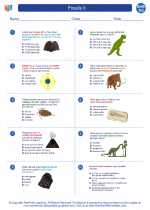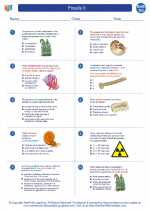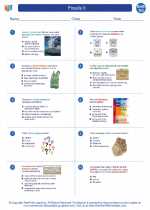Fossils II -> matter
Matter
Matter is anything that takes up space and has mass. It can exist in various states such as solid, liquid, or gas. Matter is composed of small particles called atoms and molecules. These particles are in constant motion, which gives matter its properties such as volume, density, and temperature.
States of Matter
There are three primary states of matter: solid, liquid, and gas.
- Solid: In a solid, particles are closely packed together and vibrate in place. Solids have a definite shape and volume.
- Liquid: In a liquid, particles are still close together, but they can move past each other. Liquids have a definite volume but take the shape of their container.
- Gas: In a gas, particles are far apart and move freely. Gases have neither a definite shape nor volume and fill the entire space of their container.
Properties of Matter
Matter has various properties that can be observed and measured. These properties include:
- Mass: The amount of matter in an object.
- Volume: The amount of space that matter occupies.
- Density: The mass of an object per unit volume.
- Physical state: Whether matter is a solid, liquid, or gas.
- Melting point and boiling point: The temperatures at which a solid turns into a liquid (melting) and a liquid turns into a gas (boiling).
- Conductivity: The ability of a material to conduct heat or electricity.
Changes in Matter
Matter can undergo physical and chemical changes.
Physical changes involve a change in the state or form of matter without changing its chemical composition. Examples include melting, freezing, and evaporating.
Chemical changes involve a transformation of matter into a new substance with different properties. Examples include combustion, rusting, and digestion.
Study Guide
To study matter effectively, it's important to understand the following key points:
- Learn and understand the different states of matter and their characteristics.
- Memorize the properties of matter and how they can be measured.
- Practice identifying physical and chemical changes in matter.
- Understand the particle nature of matter and how it relates to its properties.
- Review and understand the concepts of mass, volume, and density.
By mastering these concepts, you will have a solid understanding of matter and its properties.
Remember, matter is all around us, and having a good grasp of its fundamental principles will help you understand many natural phenomena and scientific concepts.



